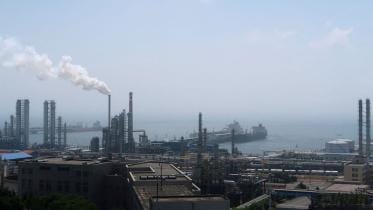Crude oil
Europe, Africa crude market tightens on Red Sea disruptions, China demand
Crude oil market in Europe and Africa are reacting to Red Sea crisis by tightening the market
22 January 2024, 10:32 AM
Oil climbs on drop in Russia exports, Red Sea jitters
Oil prices rose in Asian trade on Monday, rising nearly 1% in early trade, supported by lower exports from Russia and as attacks by the Houthis on ships in the Red Sea raised concerns of oil supply disruption.
18 December 2023, 06:55 AM
Oil rises ahead of interest rate decisions, oversupply fears linger
Oil prices ticked up on Tuesday as investors played cautious ahead of key interest rate decisions and inflation data releases, but concerns over supply surplus and slower demand growth kept a lid on gains.
12 December 2023, 05:52 AM
Oil rebounds from six-month-low but demand concerns linger
Oil prices reclaimed some ground on Thursday after tumbling to a six-month low in the previous session but investors remained concerned about sluggish demand and economic slowdowns in the US and China.
7 December 2023, 06:42 AM
Oil edges lower in choppy trade as OPEC+ delays meeting
Oil prices fell nearly 1 percent on Wednesday as OPEC+ producers unexpectedly delayed a meeting on production cuts.
23 November 2023, 05:58 AM
Oil extends gains as OPEC+ to mull deeper cuts
Oil futures nudged higher on Monday, extending gains on expectations of OPEC+ deepening supply cuts to shore up prices, which have fallen for four weeks on easing concern of Middle East supply disruption amid the Israel-Hamas conflict.
20 November 2023, 05:56 AM
Oil falls 1% as mixed China trade data offset supply cuts
Oil prices slipped by 1 percent on Tuesday, erasing most of Monday's gains, as mixed economic data from the world's second largest oil consumer China and winter demand worries offset the impact of Saudi Arabia and Russia extending output cuts.
7 November 2023, 08:06 AM
Oil rises ahead of Fed meeting as Middle East conflict persists
Oil prices edged up in early Asian trade on Wednesday ahead of key global central bank meetings this week including the US Federal Reserve, as the market also closely watched the latest developments in the Israel-Hamas conflict.
1 November 2023, 06:36 AM
Oil falls as Israel embargo concerns fade, Venezuela sanctions to ease
Oil prices fell on Thursday, reversing gains in the previous session, after OPEC showed no signs of supporting Iran's call for an oil embargo on Israel and as the United States plans to ease Venezuela sanctions to allow more oil to flow globally.
19 October 2023, 07:23 AM
Oil jumps 2% as hospital blast increases Middle East tensions
Oil prices surged on Wednesday as tension escalated in the Middle East after hundreds were killed in a blast at a Gaza hospital, sparking concerns about potential oil supply disruptions from the region.
18 October 2023, 06:58 AM
Oil soars as Hamas attack on Israel sparks war
Oil prices were up more than $3 a barrel in Asian trade on Monday as military clashes between Israel and the Palestinian Islamist group Hamas deepened political uncertainty across the Middle East and raised concerns about supplies
9 October 2023, 06:18 AM
Oil up after OPEC+ maintains output cuts but shaky demand caps gains
Oil prices inched up on Thursday, clawing back some of the previous session's big losses after an OPEC+ panel maintained oil output cuts to keep supply tight, though an uncertain demand outlook capped gains.
5 October 2023, 07:03 AM
Oil falls as US rate hike expectations offset tight supply outlook
Oil prices fell in early Asian trade on Thursday, after posting the largest fall in a month in the previous session, as US interest rate hike expectations offset the impact of drawdowns in US crude stockpiles.
21 September 2023, 06:50 AM
Oil prices rise on supply deficit concerns
Oil prices rose on Tuesday for the fourth consecutive session, as weak shale output in the United States spurred further concerns about a supply deficit stemming from extended production cuts by Saudi Arabia and Russia.
19 September 2023, 07:22 AM
Oil rises on supply concerns, China demand recovery
Oil prices rose for a third straight session on Monday, buoyed by forecasts of a widening supply deficit in the fourth quarter after Saudi Arabia and Russia extended cuts and on optimism of a demand recovery in China, the world's top crude importer.
18 September 2023, 06:26 AM
Oil prices rise to 9-month high on worries about tight supply
Oil prices gained almost 1 percent to a nine-month high on Friday on rising US diesel futures and worries about tight oil supplies after Saudi Arabia and Russia extended supply cuts this week.
9 September 2023, 06:55 AM
Oil rises to highest in over seven months on supply worries
Oil prices rose on Friday to their highest in over half a year and snapped a two-week losing streak, buoyed by expectations of tightening supplies.
2 September 2023, 08:46 AM
Oil up on record demand forecast, 7th straight weekly gain
Oil prices edged higher on Friday after the International Energy Agency forecast record global demand and tightening supplies, propelling prices to the seventh straight week of gains, the longest such streak since 2022.
13 August 2023, 06:59 AM
Oil firms to multi-month highs, eyes on US inflation data
Oil recouped early marginal losses on Thursday, climbing to multi-month peaks as the market weighed supply tightness concerns with fuel demand worries ahead of key US inflation data.
10 August 2023, 08:05 AM
Oil prices slip as bearish China data fuels demand concerns
Oil prices eased in Asian morning trade on Wednesday as concerns over slow demand from top crude importer China grew after bearish trade and inflation data, outweighing fears over tighter supply arising from output cuts by Saudi Arabia and Russia.
9 August 2023, 05:56 AM















